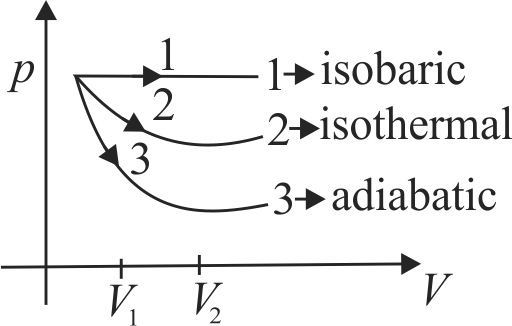371599 When 2 moles of air is given 70 calorie of heat, its temperature changes from \(20^\circ C\) to \(25^\circ C\) at constant pressure. The amount of heat required to rise the temperature of air through same range \(\left( {20^\circ C} \right.\) to \(\left. {25^\circ C} \right)\) at constant volume is \(\left(\gamma=\dfrac{7}{5}\right)\)
371601 \(1\;c{m^3}\) of water at its boiling point absorbs \(540{\mkern 1mu} {\mkern 1mu} cal\) of heat to become steam with a volume of \(1671\;c{m^3}.\) If the atmospheric pressure \( = 1.013 \times {10^5}N{m^{ - 2}}\) and the mechanical equivalent of heat \( = 4.19\;J\,cal,\) the energy spent in this process in overcoming intermolecular forces is
371599 When 2 moles of air is given 70 calorie of heat, its temperature changes from \(20^\circ C\) to \(25^\circ C\) at constant pressure. The amount of heat required to rise the temperature of air through same range \(\left( {20^\circ C} \right.\) to \(\left. {25^\circ C} \right)\) at constant volume is \(\left(\gamma=\dfrac{7}{5}\right)\)
371601 \(1\;c{m^3}\) of water at its boiling point absorbs \(540{\mkern 1mu} {\mkern 1mu} cal\) of heat to become steam with a volume of \(1671\;c{m^3}.\) If the atmospheric pressure \( = 1.013 \times {10^5}N{m^{ - 2}}\) and the mechanical equivalent of heat \( = 4.19\;J\,cal,\) the energy spent in this process in overcoming intermolecular forces is
371599 When 2 moles of air is given 70 calorie of heat, its temperature changes from \(20^\circ C\) to \(25^\circ C\) at constant pressure. The amount of heat required to rise the temperature of air through same range \(\left( {20^\circ C} \right.\) to \(\left. {25^\circ C} \right)\) at constant volume is \(\left(\gamma=\dfrac{7}{5}\right)\)
371601 \(1\;c{m^3}\) of water at its boiling point absorbs \(540{\mkern 1mu} {\mkern 1mu} cal\) of heat to become steam with a volume of \(1671\;c{m^3}.\) If the atmospheric pressure \( = 1.013 \times {10^5}N{m^{ - 2}}\) and the mechanical equivalent of heat \( = 4.19\;J\,cal,\) the energy spent in this process in overcoming intermolecular forces is
371599 When 2 moles of air is given 70 calorie of heat, its temperature changes from \(20^\circ C\) to \(25^\circ C\) at constant pressure. The amount of heat required to rise the temperature of air through same range \(\left( {20^\circ C} \right.\) to \(\left. {25^\circ C} \right)\) at constant volume is \(\left(\gamma=\dfrac{7}{5}\right)\)
371601 \(1\;c{m^3}\) of water at its boiling point absorbs \(540{\mkern 1mu} {\mkern 1mu} cal\) of heat to become steam with a volume of \(1671\;c{m^3}.\) If the atmospheric pressure \( = 1.013 \times {10^5}N{m^{ - 2}}\) and the mechanical equivalent of heat \( = 4.19\;J\,cal,\) the energy spent in this process in overcoming intermolecular forces is
371599 When 2 moles of air is given 70 calorie of heat, its temperature changes from \(20^\circ C\) to \(25^\circ C\) at constant pressure. The amount of heat required to rise the temperature of air through same range \(\left( {20^\circ C} \right.\) to \(\left. {25^\circ C} \right)\) at constant volume is \(\left(\gamma=\dfrac{7}{5}\right)\)
371601 \(1\;c{m^3}\) of water at its boiling point absorbs \(540{\mkern 1mu} {\mkern 1mu} cal\) of heat to become steam with a volume of \(1671\;c{m^3}.\) If the atmospheric pressure \( = 1.013 \times {10^5}N{m^{ - 2}}\) and the mechanical equivalent of heat \( = 4.19\;J\,cal,\) the energy spent in this process in overcoming intermolecular forces is

